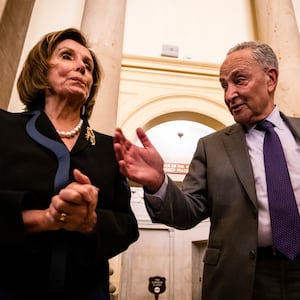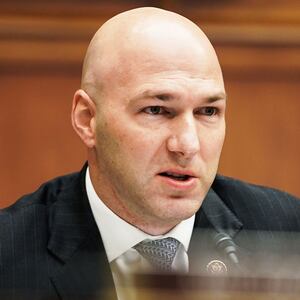As the U.S. reaches its limit for borrowing money, both Democrats and Republicans say they have no interest in seeing the federal government default on its debt. It’s just that Republicans believe they have no responsibility to vote in favor of legislation to avoid a default—and believe they should do everything in their power to block it.
According to a new report from Moody’s Analytics, if the U.S. defaults on its debt, the results could be catastrophic: six million jobs lost, a doubling of the unemployment rate, and millions of eviscerated retirement accounts.
That could happen within a month if Congress doesn’t act. Republicans are just as aware of that risk as Democrats. So their near-uniform opposition to extending the so-called debt ceiling is putting the GOP in a politically bizarre position: praying that the U.S. won’t go over the cliff, but insisting it’s not their problem to stop it.
“Don’t look at me,” said Rep. Chip Roy (R-TX), a hardcore fiscal conservative. “You guys”—the Democrats—“control every lever. I don’t even get a chance to offer an amendment on the floor of the House of Representatives. So they own it. It’s all on them.”
“They control the levers of the federal government, they own this, they can fix the problem themselves,” said Sen. Roger Marshall (R-KS).
The GOP, said Sen. Kevin Cramer (R-ND), has the “moral high ground” in this fight. Democrats, he maintained, “have the votes and the moral responsibility to pass it… whatever way they choose, as the governing majority in this place.”
While Democrats do run Washington, in the evenly-split Senate, raising the debt ceiling would not garner the 60 votes needed to advance. And Senate Republicans have made clear they will not only oppose raising the debt ceiling but also filibuster the vehicle to do it.
For months, Senate Minority Leader Mitch McConnell (R-KY) has said that Republicans would force Democrats to avert a default on a partisan basis, which would entail using a complicated and time-consuming process called budget reconciliation.
Instead of doing that, Democrats decided to call the GOP’s bluff, attaching the debt increase to legislation to keep the government open before yet another cliff—Sept. 30, when funding runs out. And some Democrats say how they handle the staunch GOP opposition in this standoff will define what they can get away with in the future.
If Democrats cave in this fight, Sen. Brian Schatz (D-HI) said, “it will never, ever, end,”
“Treating Republican bad faith and recklessness as if it’s a fixed aspect of American politics that Democrats have to navigate around, as if it’s a natural disaster or something, is a recipe for this fever to never break,” said Schatz. “So, I’m not for giving in.”
Republicans insist they will not budge and blame Democrats for the situation, saying they should have heeded McConnell’s warnings.
But some acknowledge that this situation means they are, essentially, rooting for their Democratic counterparts—who are chronically in disarray, in the GOP’s telling—to rescue the entire American economic system.
“I’m confident they’ll figure it out,” said Cramer, with a chuckle. “Either that, or they’ll implode. Right now, I have to admit, while I don’t generally relish in other people’s misery, it’s sort of fun to watch their chaos.”
That fun, of course, is a high-stakes game of chicken in which millions of jobs and the future of the U.S. economy hangs in the balance. But it’s also a game that will slow down Democratic legislation in Congress and create political problems for them ahead of the 2022 midterms.
If Democrats blink first and move to raise the debt limit on their own, it would throw a major wrench into their efforts to pass the cornerstone of Biden’s agenda: two multi-trillion-dollar bills meant to bolster the country’s infrastructure and social safety net programs.
To extend the debt ceiling with 50 votes, Democrats would have to rewrite the foundation of the $3.5 trillion social and economic policy bill, likely delaying it by several weeks. That could prove a speed bump for their agenda, or it could prove a crater: with internal tensions compelling Democrats to move as quickly as possible to pass the broader bill and a $1 trillion infrastructure bill, delays increase the possibility of defections that could sink the whole project.
Sen. Elizabeth Warren (D-MA) said “of course” Republicans were using the standoff to complicate Democrats’ legislative plans, and she dismissed Republicans’ arguments that the current crunch would have been avoided had Democrats moved earlier.
“The Republicans would not have played politics, if only the Democrats had asked them not to weeks earlier, or months earlier?” Warren asked. “That argument makes me laugh out loud.”
Republicans say the reason Democrats are reluctant to unilaterally raise the debt ceiling is that they don’t want to be attacked over the vote in the 2022 midterm elections.
“[Majority Leader] Chuck [Schumer] wants to be able to say, I didn’t spend all this money and borrow all this money alone, the Republicans helped, and we don’t agree with anything he’s doing,” said Sen. John Kennedy (R-LA).
Sen. Rick Scott (R-FL), the chairman of Senate Republicans’ campaign arm, told NBC News on Thursday that he plans to make the debt ceiling an election issue. “They’re going to get held accountable for it,” he said.
Some Republicans were willing to admit that political considerations explained the party’s debt stand. “Politically, I think that's a lot of what drives this place,” said Sen. Mike Braun (R-IN), when asked if the GOP’s debt ceiling gambit would inflict political pain on the Democrats.
“That’s part of the subterranean parlor games that are going on,” Braun said.
But Braun, a self-proclaimed fiscal hawk who says he’d vote against the debt limit increase in most any circumstance, is one of the few Republicans who is happy to talk about his party’s hypocrisy on the issue.
“For me, it’s strange, because we’ve been complicit in how we got here over time,” said Braun. “I call it part of the unholy alliance here.”
For most of history, Democrats have helped Republican majorities and presidents extend the so-called “debt ceiling,” and vice versa. Since the Obama era, Republican budget hawks have leveraged the debt ceiling’s threat of fiscal calamity to extract concessions like spending cuts.
In 2011, a new GOP House majority was able to hold up a debt ceiling extension until Democrats agreed to create a so-called supercommittee tasked with finding $1.5 trillion in spending cuts over the next 10 years, with the caveat that failing to enact that legislation would trigger automatic cuts over the next decade. (That agreement ended up being mostly meaningless, as Congress just adjusted the budget caps manually every year to ignore the automatic cuts.)
In early 2013, Republicans traded another debt limit increase for passage of the gimmicky “No Budget, No Pay Act,” which would place lawmaker pay into an escrow account until Congress adopted a budget. And then later in 2013, during an October government shutdown, Republicans accepted the reality that they had to raise the debt ceiling and reopen the government without any real concessions.
Since then, Democrats have been able to raise the debt limit every couple of years as needed without any much fanfare. Republicans have by and large traded quiet extensions of the debt ceiling for Democrats owning the task.
McConnell himself has been emphatic that he doesn’t want to see a default. “Let me make it perfectly clear: The country must never default. The debt ceiling will need to be raised,” the GOP leader said earlier this week. “But who does that depends on who the American people elect.”
McConnell’s insistence that Democrats raise the debt limit on their own goes against the history of the debt limit. Since 1978, the debt limit has been raised 59 times, according to the Congressional Research Service. Almost every single one of those votes has required bipartisan cooperation, and Republicans have rarely tried to filibuster a debt ceiling increase.
But even as McConnell insists it’d be madness to let the country default on its debt obligations, he’s introduced a new responsibility for the party in charge to single-handedly overcome the objections of the minority party to raise the limit.
Part of that is because, Republicans insist, this situation is different. For one, they say, this debt limit increase comes as Democrats plan to spend up to $5 trillion on their agenda. Voting to extend it, in their telling, would be tantamount to giving a green light to those massive spending plans.
Republicans also claim that if Democrats wanted their help, they would have offered to strike a bipartisan deal on spending. This happened in 2019, when a Democratic House, GOP Senate, and the Trump administration brokered a compromise to raise the debt limit. Democrats backed defense spending increases that the GOP desired, and the GOP accepted domestic spending increases Democrats wanted to see.
But there are holes in the GOP stances, which lawmakers prefer to avoid. Even if Democrats were not muscling through trillions in new spending, the debt ceiling would have to be raised regardless, because it reflects debt incurred in the past. And this particular borrowing limit was reached in part because of trillions of dollars in debt already run up by Trump and Republicans through tax cuts and high-spending budgets.
Democrats argue that turning the debt limit into a negotiation opportunity flies in the face of precedent—and is inappropriate on principle.
“We all understand, Democrats and Republicans, that raising the debt limit is a formality. It acknowledges what we all know—that the United States will honor its legal obligations,” Warren told The Daily Beast. “The Republicans hope they can just create more chaos right now.”
House Budget Chairman John Yarmuth (D-KY) seemed to agree with that sentiment, telling The Daily Beast that this sort of dysfunction was exactly what the American people didn’t want.
“When Congressional Republicans are willing to tank the economy and literally ruin millions of families’ livelihoods as part of some political strategy, you no longer have a loyal opposition, you have a dangerous threat to the American people,” Yarmuth said. “That is what Mitch’s obsession with power has done to the GOP.”
Whatever the reason, Republicans like Braun are happy at the unified front. He described the GOP’s about-face as “an epiphany, I guess we’ve had, that we’re all going to stand arm-in-arm and not vote to raise the debt ceiling.
“We'll see if that happens,” he continued. “It should, because everybody said they’re going to, but that doesn’t take us off the hook of how we got to this place in the first place.”
Meanwhile, some Democrats are getting antsy amid the stiff GOP opposition. Nearly all are livid that Republicans won’t help, but not many expected them to, and some feel that Democrats should have already moved to go it alone. Moreover, there are plenty of Democrats who are unconvinced that voters care about things like the debt ceiling, or that the issue will matter in 2022.
Some lawmakers are publicly suggesting that leadership map out a route for going it alone—especially because Democrats have linked an increase in the debt ceiling to extending government funding. With the Sept. 30 cliff looming, Democrats like Sen. Tim Kaine said that “we definitely want to avoid a shutdown at all costs,” telling POLITICO that a bipartisan debt ceiling increase is not worth the cost of one.
Warren, for one, acknowledged the difficulty of her party’s situation. “Democrats,” she said, “have to decide how to deal with a party that is willing to play politics, even if it means putting our economy and America’s good name at risk.”








